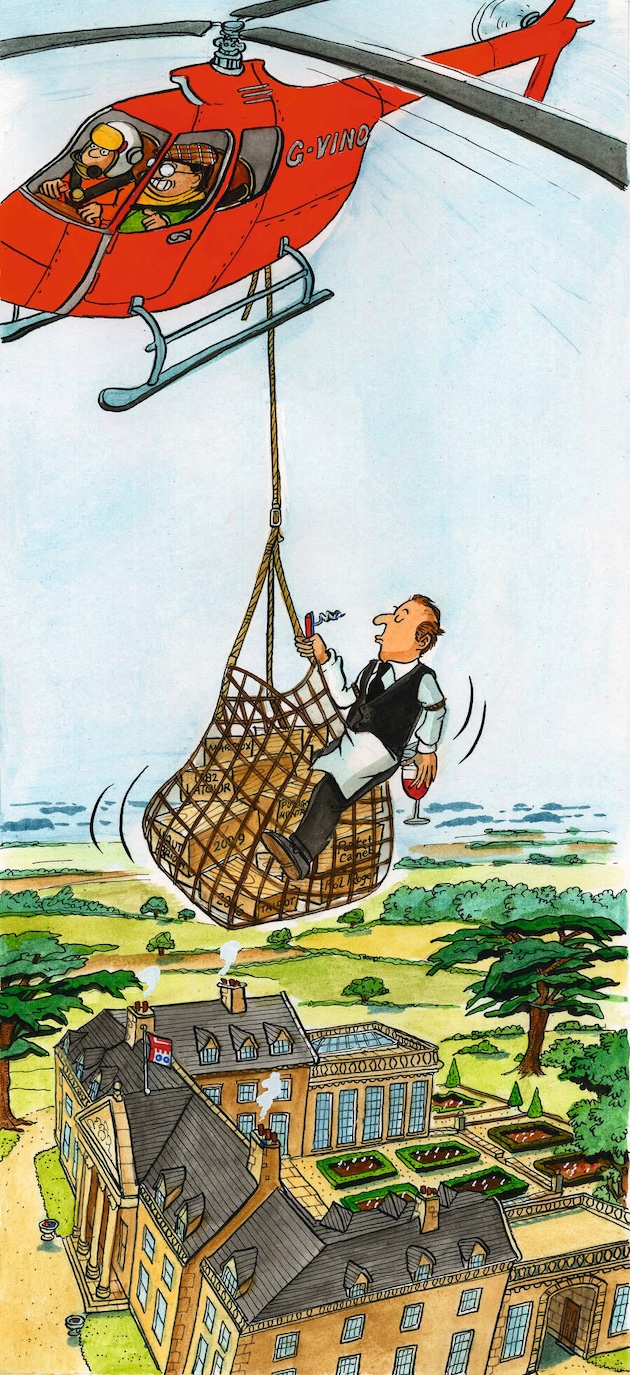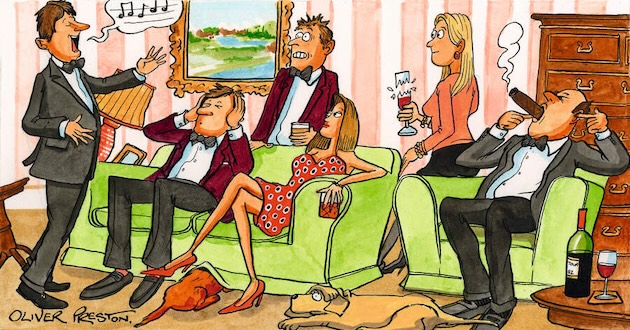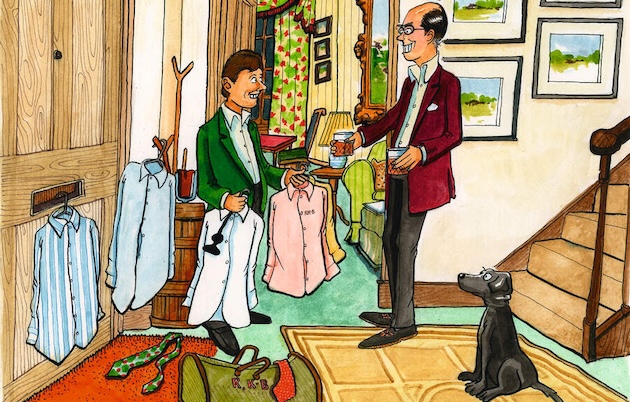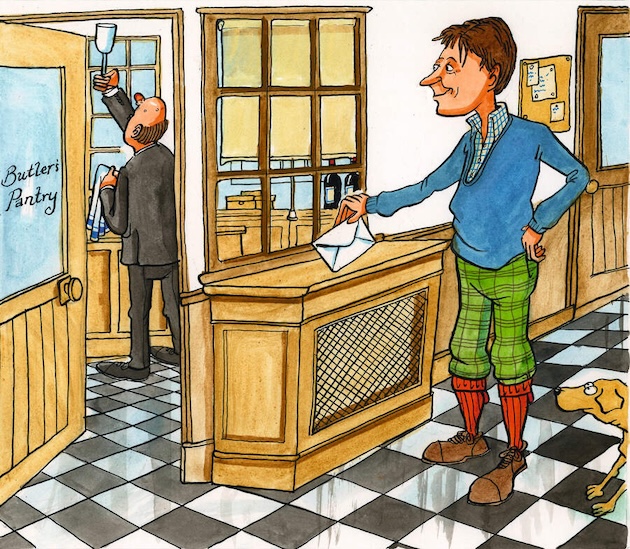When it comes to sporting house parties, knowing when to arrive, what to wear and, most importantly, when to depart will see you invited back time and again
There is a scene in AG Macdonell’s classic post-First World War comedy novel England, Their England when the protagonist, a Fleet Street journalist, is invited to a grand Kent house-party weekend. To impress his hosts, he primes a colleague to ring during dinner, pretending to be the Prime Minister and asking to speak to him. The butler of the house discreetly calls him to the hall telephone and for the rest of the weekend the journalist is warmly welcomed, his opinions in matters of state are sought out and every other solecism of dress or conduct is cheerfully overlooked.
In the age of mobile phones, such conduct might be considered an unnecessary intrusion on proceedings. For, among all the smarter and hospitable sporting houses of the nation today, a great deal of thought will have gone into where the guest should be seated at dinner, what fine wines and dishes have been chosen, and woe betide a guest who upsets the orchestrated rhythm of proceedings with an intrusive mobile ringtone.
The perfect house-party guest
As the host will have prepared the sporting weekend with meticulous attention, so it is the duty of the ideal sporting house-party guest to come fully prepared and compliant with the spirit of the invitation. This begins with its acceptance. As a former ‘debs’ delight’, I had groomed into me every detail of good-mannered etiquette. Compose a hand-written letter or card of acceptance saying at what time you will present yourself to the house. I once turned up to shoot at Robert Hiscox’s stately home in Wiltshire and one gun was missing. My host got out his file and my card was in it. The gun who had not replied – and not turned up – was not asked again. (Read how to reply to a shoot invitation.)

Then there is the timing of the arrival. On the many occasions I have stayed to hunt at the most hospitable Cheviot home of the late College Valley Master Martin Letts and his wife Eildon, a superb cook, he once said to me: “You always seem to appear at drinks time.” What other time is there to appear? Then there is the matter of parking. The home of Mike and Fi Mitchell in the Duke of Beaufort’s hunting country has long been known for its unrivalled hospitality. However, Mike Mitchell has a special place where he parks his Land Rover and even a sign saying so, ignored at your own risk.
In Scotland, Tom Murray, now HM The King’s Purse-Bearer at the Palace of Holyroodhouse – a role that involves his planning of many state and Royal dinners there – has an ashtray in the spare bedroom of his home in Fife. It simply reads: ‘When I said you could stay on on Sunday night, I was lying.’ The perfect sporting guest knows when to arrive and, more importantly, when to depart.
After your host and hostess, the most significant people of the weekend to ensure you are invited again are the butler (if there is one) and the house staff. These are the first people with whom your hosts will mull over the weekend on a Monday morning, so a good (and generous) impression is vital. A slightly modern incursion into tipping, or what the late and great foxhunter Captain RE Wallace called “a pourboire”, is a letter box placed in the hall where your host will tell you: “We share this among all staff at Christmas.” I wholly disagree with this. I place my gratuity in an envelope by my bed or take it to the butler’s pantry with my name on it addressed to the recipient with whom I will hopefully have had some happy conversations over the weekend. (Read more on tipping here.)
The key for the perfect guest is to come fully prepared for both the sport and hospitality they will enjoy. At Holkham in Norfolk, the Earl and Countess of Leicester run not just an immaculate estate but a renowned grey partridge shoot. I was once staying at the pub, The Queen Victoria, when I got a call from Tom Leicester asking me to dinner with his shooting guests. “Smoking jacket and jeans,” he said, to my alarm. To make me feel more at home he gave me his son’s smoking jacket to wear. Bobby Faber, with whom I have stayed on several occasions to hunt with the Duke of Beaufort’s, keeps a prodigious dining table. He once observed I had arrived with eight shirts. In that most sociable part of England you never know what you are going to be asked to wear or where you might next be invited, so a full wardrobe in the back of your car is essential. (Read more on smoking jackets, dinner jacket or tails.)
Always bring gumboots
It was that popular East Devon MP Sir Hugo, now Lord, Swire who told me he never travelled anywhere without a pair of wellington boots in the back of his car. I have copied him ever since. He also travels well prepared for an ‘after-dinner turn’ if asked, and his humour and anecdotes are without equal – coupled with being a fine sportsman and good shot. Nothing, however, had prepared me for a dinner that we both attended at the Devon home of Lord and Lady Roborough, who run the highly regarded Maristow shoot. Unbeknown to me, it is a Swedish tradition of Lady Roborough that after dinner, guests should be asked to sing a song or tell a story. My own singing efforts were saved by that fine musician James Studholme (his band, Police Dog Hogan, has a loyal following), who also has a welcoming small shoot near Exeter.
The final thing about country-house-party dinners is the importance of ‘turning’. This involves the practice of guests talking to the person on their left until halfway through the main course and then segueing into a conversation with the person on the right. The habit of the ladies ‘withdrawing’ after dinner so the gentlemen can take port is still maintained in many larger houses. This is embraced by the traditional lady sporting-house guests to which those of a more feministic temperament should ignore at their peril.
How do you reciprocate the generosity of timeless hospitality and sport that, in its finer examples, still resemble a scene from a novel by Trollope, Thackeray or Jane Austen, where guests change into dinner jackets and the welcome rustle of a taffeta evening dress? Robin Grant-Sturgis, perhaps the best natural shot in the West Country, and his wife Sue, are the finest of hosts. “People invite you because they enjoy your company, knowing that you can hunt or shoot or fish and will add to the gaiety of the day,” he says. “They do not expect an invitation in return unless you have one to offer.”
So, for a guest who is good company but of slender means, the history of shooting and hunting is full of such sportsmen who add immeasurably to proceedings. Hunting has its ‘Soapy’ Sponges and Jack Spraggons. In real and more recent times, shooting had such heroes as Archie Coats, the great pigeon shot. He was on my stepfather’s syndicate at the Duke of Buccleuch’s Boughton estate in Northamptonshire in the 1970s. Not only did he add handsomely to the bag but his knowledge and company were worth their weight in gold.
That is not to say that a thoughtful gift to the host house will go amiss. One gun I know arrives at his host’s by helicopter with the finest wines and his own sommelier for the weekend. But one does not have to go to such extremes. A thoughtful book relating to the host’s interest or a particularly ancient malt whisky will always go down well.
What will also be appreciated is appearance on the shooting or hunting day, the willingness to talk to the hunt staff or keepers and the appropriate moment to show ready admiration for the skill and effort they put in. For some years I fished as a guest on the Carron in Invernessshire and so enjoyed the company and stories of the gillie Allan Donaldson (as well as his piscatorial wisdoms) that all thoughts of the outside world were completely forgotten. I feel dismayed if, as I have witnessed on some shoots, a gun does not wear a tie. This, I think, is disrespectful to host, staff and quarry. And nowhere on the sporting field is it necessary to wear aftershave.

None of this is to say that I have not made the occasional blunder. For several years I was a guest at that fine shoot of Anne Henson at Kirkham Hall in Yorkshire, run by her great friend and former Middleton huntsman Frank Houghton Brown Here the many clocks are wound daily and the dining room sparkles with chandeliers. On one occasion, I got a call at lunchtime saying that my Scottish nanny was dying in a Kelso rest home. Asking Anne if I could be excused dinner, she replied: “I have set my table for dinner and you will attend.” I did and, getting up at five next morning, just made it to my nanny’s final hour with Jane, Duchess of Roxburghe and the Floors Castle cleaning lady also at her bedside.
Only a well-behaved shooting dog should accompany the ideal sporting party guest. That includes good behaviour in the house, in the kennel and on the field of play. Someone always welcome to hunt and shoot with me is former Derwent Master and huntsman Sean McClarron from Yorkshire. After a week staying for the finest sport, he sent a magnificent dog basket for one of my spaniels. He had her name embroidered into it. (Read more on shooting etiquette.)
I have heard that some shooting guests today write emails of thanks. This would never have done in the days of Macdonell’s Fleet Street hero and nor should it do in modern times. Hosts who give out game cards at the end of the day also treasure hand-written letters of thanks to help them remember, or indeed point out, highlights of the day’s proceedings. There may be a quip that stands out. None, surely, will better that once said by the late Duke of Edinburgh of a Northumbrian Cabinet minister (and it should be a caution to any greedy shot who will surely never be asked again): “Too good a shot to be a gentleman.”
Five of the best presents for hosts
- A gardening book by Ursula Buchan, Lady Mary Keen or Isabel Bannerman
- A finely chosen malt from the Scotch Whisky Experience
- A pair of leather shooting mittens from Oliver Brown
- Plants, especially roses from David Austin
- A poem, ditty or short story written by yourself about the day






